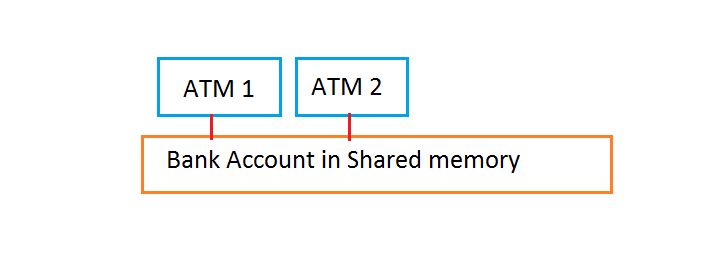
Non-generic parameter
List list = new ArrayList();
list.add("BootCampers are the best");
String str = (String) list.get(0);Generic parameter
List<String> list = new ArrayList<String>();
list.add("BootCampers are the best");
String str = list.get(0); // No casting requiresAllows user to define type for a Class or an Interface
public class Box {
private Object object;
public void set(Object object) { this.object = object; }
public Object get() { return object; }
}class name<T1, T2, ..., Tn> { /* ... */ }
public class Box<T> {
// T stands for "Type"
private T t;
public void set(T t) { this.t = t; }
public T get() { return t; }
} public class BoxInTheBox<T,Box<String>> {
/* Some code */
} Box<Object> objBoxer = new Box<>(); class Pairing <O1, O2> {
private O1 obj1;
private O2 obj2;
public Pairing(O2 o2, O1 o1) {
this.obj1 = o1;
this.obj2 = o2;
}
public O1 getFirstO1() {
return this.obj1;
}
public O2 getFirstO2() {
return this.obj2;
}
public String toString() {
return "(" + obj1.toString() + ", "+obj2.toString() + ")";
}
}
class Male {}
class Female {}
class Test {
public static void main(String[] args) {
Male newMale = new Male();
Female newFemale = new Female();
Pairing<Male, Female> marryThem = new Pairing<>(newFemale, newMale);
System.out.println(marryThem.toString());
}
}


Scenario when everything is normal
get balance (balance = $50)
add $100
write back result (balance = $150)
get balance (balance = $150)
add $50
write back result (balance = $200)Scenario with concurrency
get balance (balance = $50)
get balance (balance = $50)
add $100
add $50
write back result (balance = $150)
write back result (balance = $100)Scenario with parallelism
get balance (balance = $50) get balance (balance = $50)
add $100 add $50
write back result (balance = $150) write back result (balance = $100)Override the run method of the Thread class
class FindCountOfEvenNumbers extneds Thread {
private int maxNumber;
private int count;
FindCountOfEvenNumbers(int maxNumber) {
this.maxNumber = maxNumber;
this.count = 0;
}
public void run() {
for (int i=0; i<this.maxNumber; ++i)
{
if (i % 2 == 0)
++count;
}
}
} FindCountOfEvenNumbers newThread = new FindCountOfEvenNumbers(1200);
new Thread(findNumber).start(); FindCountOfEvenNumbers findNumber = new FindCountOfEvenNumbers(1200);
Thread t = new Thread(findNumber);
t.start();That class impements the run methods too
class FindCountOfEvenNumbers implements Runnable {
private int maxNumber;
private int count;
FindCountOfEvenNumbers(int maxNumber) {
this.maxNumber = maxNumber;
this.count = 0;
}
public void run() {
for (int i=0; i<this.maxNumber; ++i)
{
if (i % 2 == 0)
++count;
}
}
} //Implementing Runnable Interface
class ImplementsRunnable implements Runnable {
private int counter = 0;
public void run() {
counter++;
System.out.println("ImplementsRunnable : Counter : "+ counter);
}
}
//Extending Thread class
class ExtendsThread extends Thread {
private int counter = 0;
public void run () {
counter++;
System.out.println("ExtendsThread : Counter : "+ counter);
}
} public class ThreadVsRunnable {
public static void main(String args[]) throws Exception {
// Multiple threads share the same object.
ImplementsRunnable rc = new ImplementsRunnable();
Thread t1 = new Thread(rc);
t1.start();
Thread.sleep(1000); // Waiting for 1 second before starting next thread
Thread t2 = new Thread(rc);
t2.start();
Thread.sleep(1000); // Waiting for 1 second before starting next thread
Thread t3 = new Thread(rc);
t3.start();
// Creating new instance for every thread access.
ExtendsThread tc1 = new ExtendsThread();
tc1.start();
Thread.sleep(1000); // Waiting for 1 second before starting next thread
ExtendsThread tc2 = new ExtendsThread();
tc2.start();
Thread.sleep(1000); // Waiting for 1 second before starting next thread
ExtendsThread tc3 = new ExtendsThread();
tc3.start();
}
} ImplementsRunnable : Counter : 1
ImplementsRunnable : Counter : 2
ImplementsRunnable : Counter : 3
ExtendsThread : Counter : 1
ExtendsThread : Counter : 1
ExtendsThread : Counter : 1 Thread pThread = new Thread();
pthread.start();
//Make thread sleep for 5 seconds
pthread.sleep(5000);
//Interrupts thread's execution
pthread.stop(); class TestInterruptingThread1 extends Thread{
public void run(){
try {
Thread.sleep(10000);
System.out.println("task");
} catch(InterruptedException e) {
throw new RuntimeException("Thread interrupted..." + e);
}
}
public static void main(String args[]){
TestInterruptingThread1 t1 = new TestInterruptingThread1();
t1.start();
try {
t1.interrupt();
} catch(Exception e) {
System.out.println("Exception handled " + e);
}
}
} Exception in thread "Thread-0" java.lang.RuntimeException: Thread interrupted...java.lang.InterruptedException: sleep interrupted
at TestInterruptingThread1.run(TestInterruptingThread1.java:7)Method that allows a thread to wait for the completion of another thread.
t.join();Consider a thread P running and find t.join() in its execution code, P thread must wait from t thread to finish in order o continue its execution.
FindCountOfEvenNumbers findNumber = new FindCountOfEvenNumber(1200);
Thread t = new Thread(findNumber);
t.start();
System.out.println("Now thread " + t.getName() + " is running");
t.join();Method that allows a thread to wait for the completion of another thread.
t.join();Consider a thread P running and find t.join() in its execution code, P thread must wait from t thread to finish in order o continue its execution.
FindCountOfEvenNumbers findNumber = new FindCountOfEvenNumber(1200);
Thread t = new Thread(findNumber);
t.start();
System.out.println("Now thread " + t.getName() + " is running");
t.join(1000); public class SimpleThreads {
static void threadMessage(String message) {
String threadName = Thread.currentThread().getName();
System.out.format("%s: %s%n",threadName, message);
}
private static class MessageLoop implements Runnable {
public void run() {
String importantInfo[] = {"Mares eat oats","Does eat oats","Little lambs eat ivy","A kid will eat ivy too"};
try {
for (int i = 0; i < importantInfo.length; i++) {
Thread.sleep(4000);
threadMessage(importantInfo[i]);
}
} catch (InterruptedException e) {threadMessage("I wasn't done!");
}
}
}
public static void main(String args[])throws InterruptedException { public static void main(String args[])throws InterruptedException {
long patience = 1000 * 60 * 60;
// If command line argument
// present, gives patience
// in seconds.
if (args.length > 0) {
try {
patience = Long.parseLong(args[0]) * 1000;
} catch (NumberFormatException e) {
System.err.println("Argument must be an integer.");
System.exit(1);
}
}
threadMessage("Starting MessageLoop thread");
long startTime = System.currentTimeMillis();
Thread t = new Thread(new MessageLoop());
t.start();
threadMessage("Waiting for MessageLoop thread to finish");
while (t.isAlive()) {
threadMessage("Still waiting...");
t.join(1000);
if (((System.currentTimeMillis() - startTime) > patience)&& t.isAlive()) {
threadMessage("Tired of waiting!");
t.interrupt();
t.join();
}
}
threadMessage("Finally!");
}
} public synchronized dataype method() {}public class Counter implements Runnable {
private int c = 0;
public synchronized void increment() { c++; }
public synchronized void decrement() { c--; }
public synchronized int value() { return c; }
public synchronized void run() {
increment();
System.out.println("I am thread" + Thread.currentThread().getName() + "and the c value is " + value());
decrement();
}
}public class SimpleThreadWithMain {
public static void main(String[] args) {
// TODO Auto-generated method stub
Counter variableA;
variableA = new Counter();
new Thread(variableA).start();
new Thread(variableA).start();
new Thread(variableA).start();
new Thread(variableA).start();
new Thread(variableA).start();
new Thread(variableA).start();
}
}
It's give to you a class name Hedonism that receives five parametric types and also class Granch.
Also create four classes with the following names: Cellulase, Semiserf, Mina, and Contrite
with nothing inside the classes.
Now, create a class named Trikeria with public visibility and main class that has a public static
method named stenchful.
This method does not have any arguments. This method also creates objects from classes Cellulase, Semiserf,
Mina, Contrite, and Granch. Furthermore, it creates an object from class Hedonism with the parameter types
of Cellulase, Semiserf, Mina, Contrite, and Granch (with this exact sequense). In the end, method stenchful
calls method myoglibin from class Hedonism with the "correct created object" and returns the result of the
method....
The return data type of myoglobin defines the return time of stenchful too.
At the end call method print from Granch class.
Source code can be found at https://drive.google.com/open?id=0B4OihM0nDwEJNERadzZKSGhHYkE
Write a generics method that can swap the first element of an array with the last, the
second with the semilas and keep going.
The first array has int as data type with numbers from 1 to 10.
The second array has double as data type with numbers from 1 to 10.
Does the following code compiles without any error?
public final class Algorithm {
public static <T> T max(T x, T y) {
return x > y ? x : y;
}
}Take your time to think about it, the answer is on the next page
No! The ">" symbols applies only on primitive numeric types
Remove the synchronized parameter from all the methods of the Counter and run the program and observe its behavior.
Consider having an array with elements starting from 1,2,3,....,998,999,1000.
Create a thread pool with any data structure you like (array, linklist, arraylist, etc.) that has 10 threads.
Balance your work-load among threads and find out the sum of all elements from the array.
This problem can be solved easily with many others ways, although, you are summoned to solve it
using threads.
For this exercise you are called to create Fibonacci program and find the end results of number 50.
Create a thread that will execute the Fibonacci code and when the thread is done print the end result.
Use the existing class from here https://drive.google.com/open?id=0B4OihM0nDwEJRGtnaHhTaUhqV1U
As an advanced part of this exercise try to reduce the programs execution time with multiple
threads
Results = 12586269025
